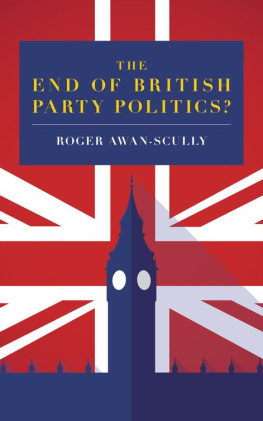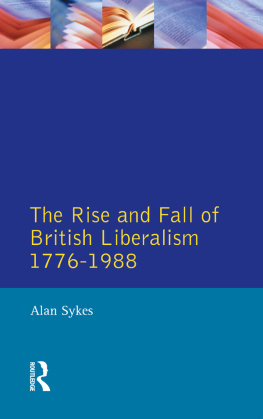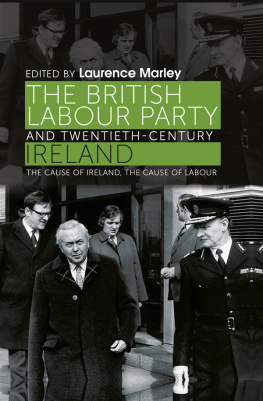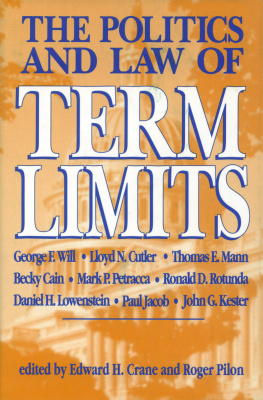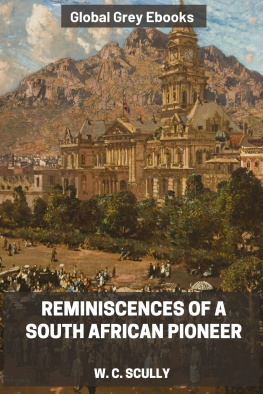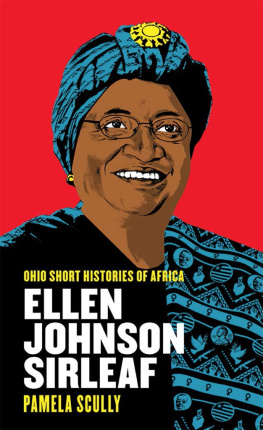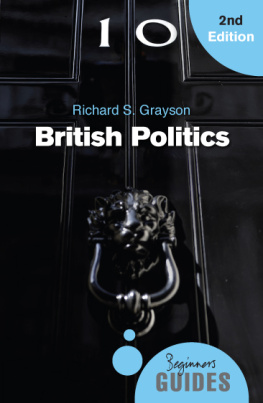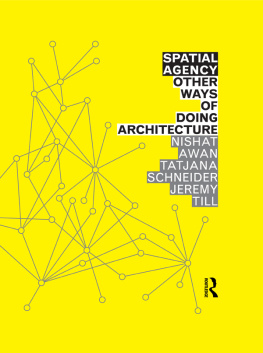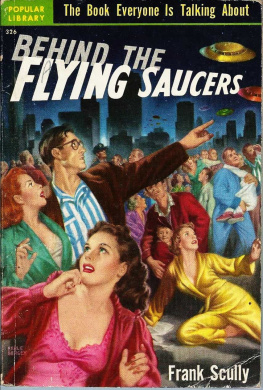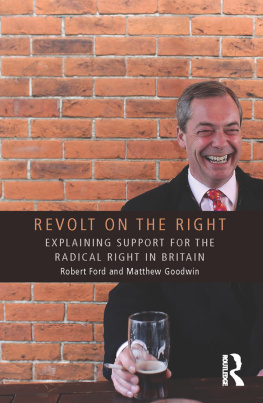Roger Awan-Scully - The End of British Party Politics?
Here you can read online Roger Awan-Scully - The End of British Party Politics? full text of the book (entire story) in english for free. Download pdf and epub, get meaning, cover and reviews about this ebook. City: Great Britain, year: 2018, publisher: Lightning Source Inc.;Biteback Publishing Ltd, genre: Politics. Description of the work, (preface) as well as reviews are available. Best literature library LitArk.com created for fans of good reading and offers a wide selection of genres:
Romance novel
Science fiction
Adventure
Detective
Science
History
Home and family
Prose
Art
Politics
Computer
Non-fiction
Religion
Business
Children
Humor
Choose a favorite category and find really read worthwhile books. Enjoy immersion in the world of imagination, feel the emotions of the characters or learn something new for yourself, make an fascinating discovery.
- Book:The End of British Party Politics?
- Author:
- Publisher:Lightning Source Inc.;Biteback Publishing Ltd
- Genre:
- Year:2018
- City:Great Britain
- Rating:4 / 5
- Favourites:Add to favourites
- Your mark:
- 80
- 1
- 2
- 3
- 4
- 5
The End of British Party Politics?: summary, description and annotation
We offer to read an annotation, description, summary or preface (depends on what the author of the book "The End of British Party Politics?" wrote himself). If you haven't found the necessary information about the book — write in the comments, we will try to find it.
The End of British Party Politics? — read online for free the complete book (whole text) full work
Below is the text of the book, divided by pages. System saving the place of the last page read, allows you to conveniently read the book "The End of British Party Politics?" online for free, without having to search again every time where you left off. Put a bookmark, and you can go to the page where you finished reading at any time.
Font size:
Interval:
Bookmark:
E very UK general election prompts huge amounts of commentary. The electoral analysis industry has never been more vibrant: in addition to the traditional outlets of books, newspapers, magazines and the broadcast media, there is now an ever-expanding universe of online content of various forms (and varying levels of quality).
Understandably, most analysis of elections focuses on the here and now: the election about to happen, currently under way, or recently past. There is always plenty to examine in the present, and plenty of reason to do so. But sometimes it can be valuable to try to step back from the current tumult and see the bigger picture to examine not only the fascinating detail of the individual trees, but also the contours of the wood that they collectively form.
That is what this book tries to do. While I do spend some time examining the 2017 general election, I locate this vote in a broader historical context. And I examine 2017 not primarily for its impact on who currently resides at 10 Downing Street, but for what the election says about the unity and coherence of the United Kingdom.
Famously, no man (or, indeed, woman) is an island, and certainly no author is. Even a relatively short book like this incurs many debts of gratitude, which I am happy to acknowledge.
May I firstly thank Iain Dale, for believing in this book; and Olivia Beattie and the rest of the team at Biteback for their patience and assistance in getting it to the finishing line.
I would also like to thank the many professional colleagues, at Cardiff University and elsewhere, and many others with whom I have had the privilege of discussing the ideas in this book.
I am very grateful to my family and friends, for all their love and support.
Most of all, though, I would like to thank the one person who has helped far more, and in more ways, than any other my wife, the extraordinary Shazia Awan-Scully. Shukria, meri jaan.
I t was the last party election broadcast before the 2017 general election, and so provided one of the final chances for the party to push its message to the voters. Unsurprisingly, the party chose to make plentiful use of its leader. Confounding many expectations, he had proven to be an effective campaigner over the previous few weeks. Opinion polls had shown his popularity rising consistently since Theresa May had surprised everyone on 18 April by calling the snap election. The leader had defied his critics: he had been front and centre of the campaign, and the partys greatly improved poll ratings suggested that his leadership had worked. Indeed, when the final result a few days later turned out even better than the polls had indicated, the leader emerged a greatly strengthened political figure. The result was widely seen as a personal triumph for him, and those both inside and outside the party who had previously questioned his leadership either fell silent or publicly voiced their praise and loyalty.
I am talking, of course, about the Labour Party leader. But it is not Jeremy Corbyn to whom I refer. I am actually talking about the somewhat less well-known figure (certainly outside Wales, and perhaps even within it) of Carwyn Jones, First Minister of Wales and leader of the Welsh Labour Party. This small example, from the final party election broadcast by Labour in Wales, is one telling illustration of a much broader point a point which forms the central argument of this book.
Elections are about choices. In a representative democracy, an election is the mechanism that allows the people to choose who governs over them. Of course there is much more to it than that. A functioning democracy requires those elections to be free and fair. There can be arguments about who the people are defined to be, and thus who is eligible to vote. Democratic political systems differ: in parliamentary democracies we vote only for representatives in a legislature, which in turn produces a government, whereas in presidential systems the people vote directly for the chief executive. There are also differences in electoral systems: how people cast their ballots, and the ways in which those votes are converted into an electoral outcome. And some very important and powerful official positions, such as membership of constitutional courts or the leadership of central banks, are not normally elected. But the basic principle of representative democracy is still clear: we, the people, choose who governs.
We do not, as Karl Marx might have put it, make our electoral choices just as we please. We choose from a menu of options. Political parties provide the options on that menu. Democracy in the UK, and in nearly every other established representative system, remains very much a party democracy: organised political movements, which we normally call parties, provide the overwhelming majority of candidates for major elections, and an even greater proportion of those actually elected. As we will discuss later on, political parties in the UK may well have declined in some respects; but their electoral dominance shows no sign of fading.
Of course, we dont always get the menu of options we would like. Lots of people are unhappy with the available choices in most elections. There has been a broad decline in faith in political parties over several decades in the UK, and in many other democracies. Notwithstanding recent surges for the Scottish National Party (SNP) in the wake of the 2014 Scottish independence referendum and the Labour Party around the election of Jeremy Corbyn as leader, party membership tallies have generally fallen over recent decades. In the electorate as a whole we see a similar picture: far fewer people have a strong and enduring loyalty to, or identity with, a party than used to be the case. Unhappiness with the options available to them is a major reason why many people refuse to participate in electoral politics. But even when it is unsatisfactory to many of us, the menu of options still matters. From one, or some combination, of the available parties a government will be formed after every election.
However, the nature of those electoral menus has changed in a fundamental way. The choices before us were once largely common across Britain. But voters in the UKs four nations are increasingly being presented with fundamentally different, and largely disconnected, sets of political options. We continue to elect one House of Commons but we do so from four distinct and mostly separate electoral contests. A genuinely British democratic politics is being hollowed out. This book is about how and why this has occurred, and why it matters.
* * *
What unites a country? Perhaps a common language, maybe a shared religion, or possibly a sense of ethnic similarity. Peoples can also become more united through facing a common enemy. But in an important sense, in a democracy peoples can also be united by their differences. Democracy does not seek to abolish differences within a society; it merely provides for their peaceful airing, and their settling via elections and the other processes of representative politics. We may not always get the governments, or the policies, that we want. But we all get the chance to take part in the process. And that may allow us to accept it when we dont get what we want. To work, democracy ultimately depends on losers consent: the willingness of the defeated to accept both the outcome and the legitimacy of the process by which it was reached.
But this uniting through our differences is only likely to occur within a country if the pattern of political differences is broadly similar across the nation. Do we have a common political debate, and a common set of political options? If so, then we may come to feel part of a single political community. If not, an election can become a rather disconnected set of coinciding events in different parts of the country. In the worst-case scenario, political debates may have so little in common that the interests and concerns of different places can appear completely different or even antagonistic, and elections can become a sort of regional or ethnic head count.
Font size:
Interval:
Bookmark:
Similar books «The End of British Party Politics?»
Look at similar books to The End of British Party Politics?. We have selected literature similar in name and meaning in the hope of providing readers with more options to find new, interesting, not yet read works.
Discussion, reviews of the book The End of British Party Politics? and just readers' own opinions. Leave your comments, write what you think about the work, its meaning or the main characters. Specify what exactly you liked and what you didn't like, and why you think so.

